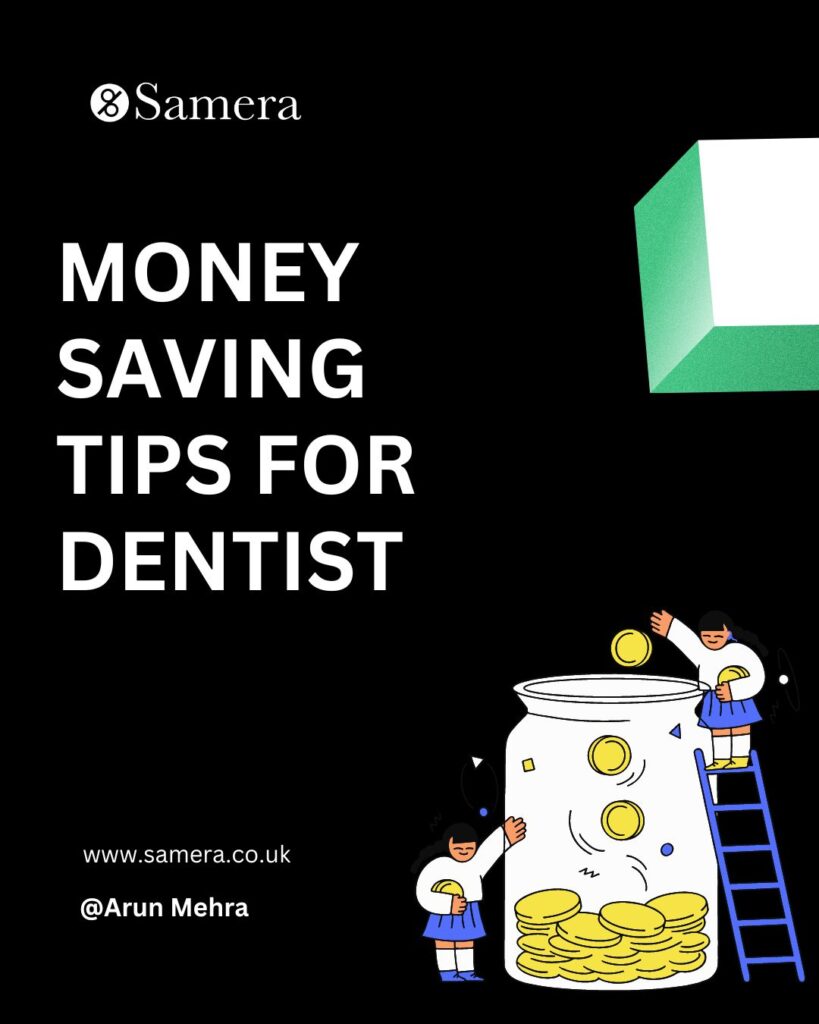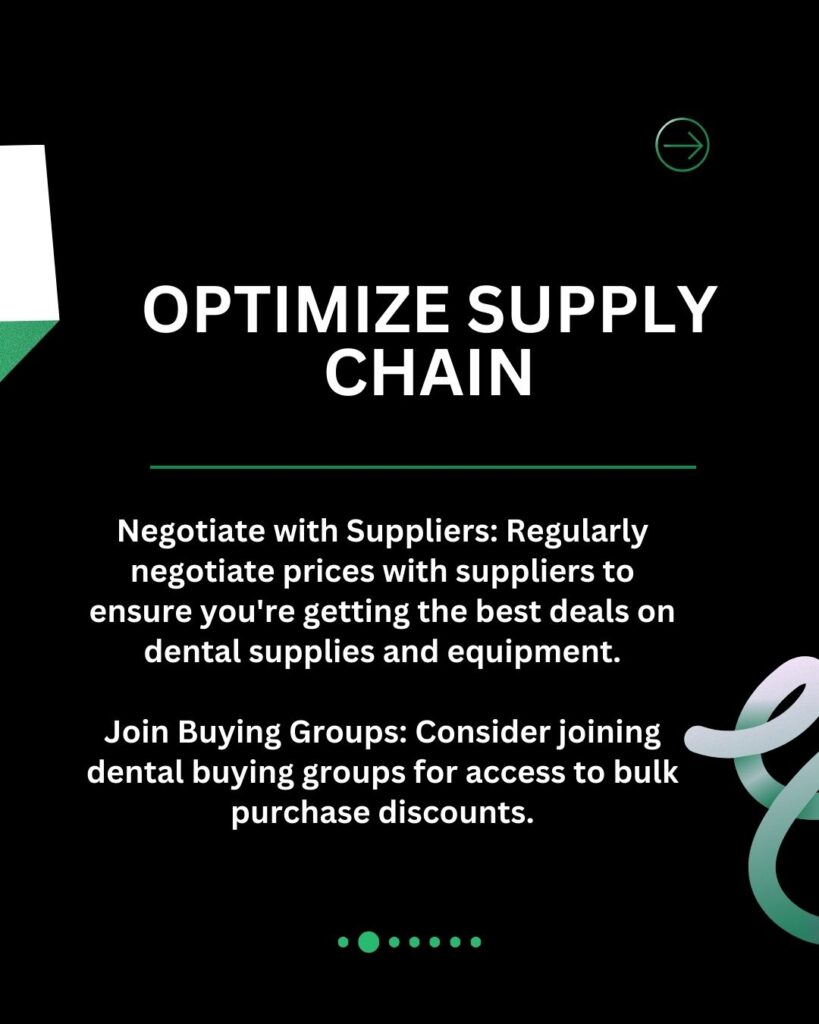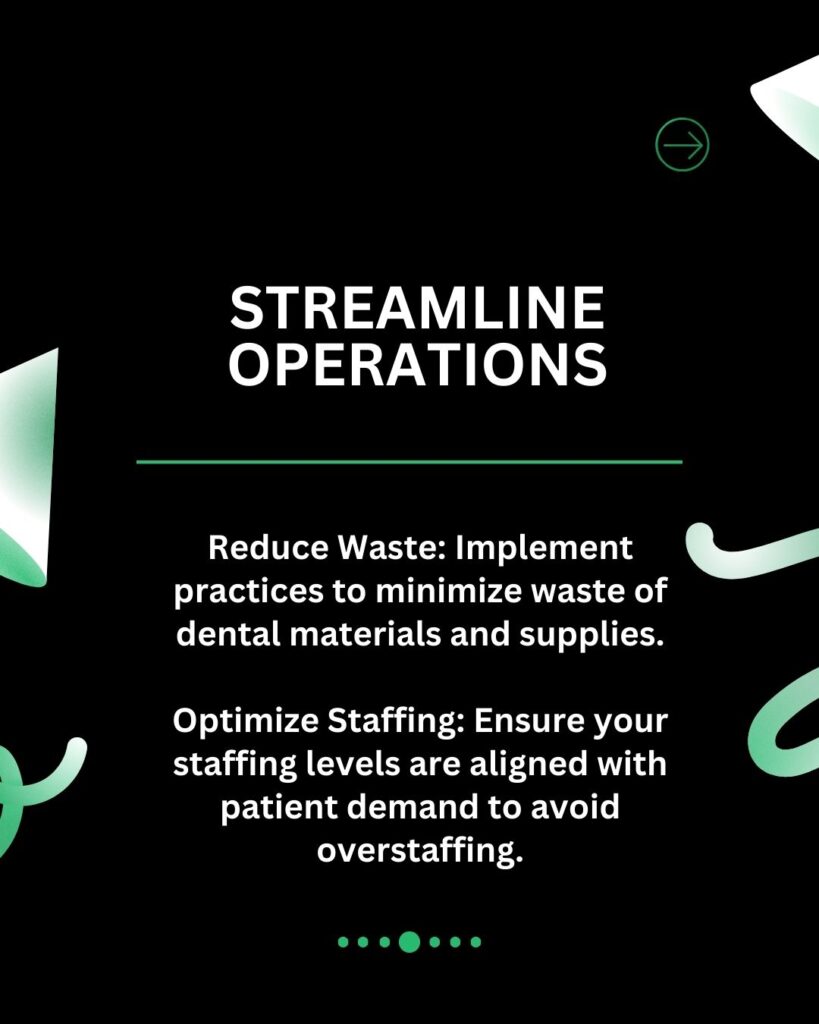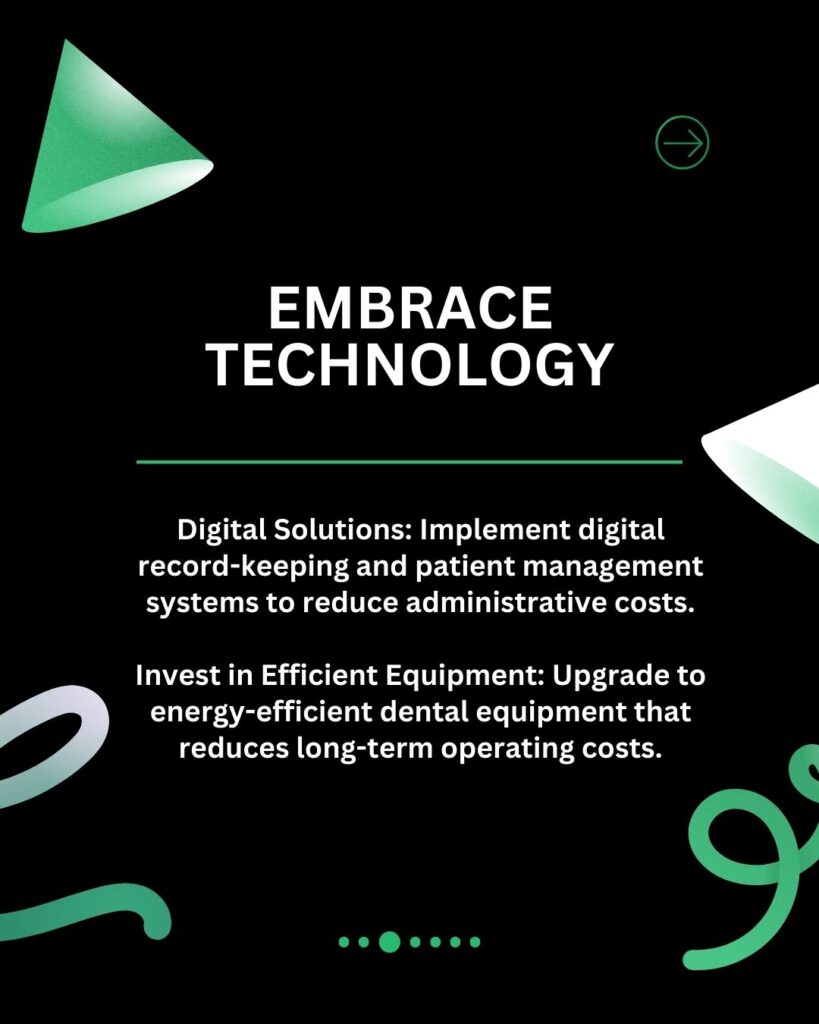Running a dental practice is not easy, and it can be expensive. You have to pay for things like equipment, supplies, staff, and rent, which can eat into your profits. But there are ways to save money without compromising patient care. In this article, we will share some tips to help you save money in your dental practice. You can negotiate with suppliers, reduce waste, and make your operations more efficient to cut costs.
When it comes to saving money, dentists walk a tightrope. This is because any minuscule changes you make to your dental practice can have the opposite effect and could hurt your business instead of helping.
With a dental business it is very hard to cut overheads, such as property costs, employee salaries and administrative services. These are things you need to spend on to maintain your dental practice and keep patients coming through the door. That’s what makes saving money on these things very tricky.
As a dentist, you are always committed to your patient’s health and wellbeing. However, as a business owner, you need to earn the necessary profits to sustain and grow your practice. Samera helps dentists all over the UK find the right balance in the inflationary environment we now live in.
In a time where inflation and interest rates are rising, much like many other expenses, shopping around for better deals on everything you need in your practice is a necessity.
However, Samera cuts this need entirely by automatically finding you the best value options from the leading brands in the industry through the Samera Dental Buying Group. Get in touch with Team Samera to see how we can help you save money today, but in the meantime have a read of our tips below.
Click here to read more about how to cut expenses in a small business.
By following these tips, you can run a successful practice while keeping more money for yourself. Whether you have a small practice or a large dental group, keep reading to learn how to save money and improve your profits.

Top Money-Saving Tips for Your Dental Practice – Webinar
First of all, watch this free webinar in which Arun discusses ways in which you can save money in your dental practice, from utility bills to dental equipment and consumables.
Introduction: The importance of saving money in your dental practice
Running a successful dental practice means taking good care of your patients and managing your money well. We know that providing excellent dental care requires investing in equipment, supplies, and staff. But it’s also important to find ways to save money without compromising the quality of service.
By using smart strategies to save money, you can make your practice more profitable, streamline operations, and ensure long-term success. In this blog post, we will give you valuable tips to help you save money in your dental practice. We’ll talk about optimising your supply chain and using cost-effective technology, among other things.
Saving money in your dental practice not only helps your finances but also allows you to invest in things like training your team or improving your practice’s infrastructure. So, let’s get started and learn the best money-saving tips to make your dental practice thrive while keeping your finances in order.
Action Point
Optimize your dental practice’s finances by negotiating for better supply prices, embracing cost-effective technology, and streamlining operations to boost profitability without compromising care quality.

Evaluate your expenses
Identify areas where you can cut costs
To run a successful dental practice, it’s important to manage your finances wisely. One way to increase your profits is by looking at your expenses and finding areas where you can spend less money. This will help you use your resources more effectively.
First, go through your budget and examine each expense. Look at things like supplies, equipment, utilities, and employee salaries. See if there are any costs that seem too high or unnecessary. For example, you might discover that you’re spending too much on certain supplies or paying for services you don’t really need.
Next, think about alternatives or ways to save money for each expense. Can you negotiate better deals with your suppliers? Are there cheaper options for equipment maintenance or repairs? Can you find ways to use less energy and lower your utility bills? These are all things you can consider.
Another area to focus on is your staff’s schedule. By making sure your employees work efficiently and optimising their hours, you can potentially reduce labour costs without compromising patient care. Think about implementing flexible schedules, training your staff to do different tasks, or outsourcing some administrative work.
You can also use technology to make your operations more efficient and save money. Digital record-keeping, online appointment scheduling, and automated reminders can help you cut administrative costs and work more efficiently.
Remember, reducing costs doesn’t mean you have to compromise on quality or the experience you provide to your patients. It’s about finding smarter ways to use your resources without sacrificing the level of care you give. By regularly reviewing your expenses and making strategic changes, you can save money and improve the financial health of your dental practice.
Action Point
To boost your dental practice’s financial health, thoroughly review expenses and identify savings opportunities without compromising care quality. Consider negotiating better supply deals, optimizing staff schedules, and utilizing technology for efficiency. Regular financial evaluations and strategic adjustments can lead to significant savings and enhance profitability.
Negotiate with suppliers
Tips for getting better deals on dental supplies
Negotiating with suppliers is important for your dental practice’s finances. Getting better deals on dental supplies can lower your costs and increase profits. Here are some tips to help you negotiate and get the best deals:
Research prices: Before negotiating, know the market prices for the supplies you need. Compare different suppliers’ prices, quality, and reputation. This knowledge will help you during negotiations.
Build relationships: Having good relationships with suppliers can help you get better deals. Communicate with them regularly, give feedback, and show you’re a loyal customer. Suppliers are more likely to negotiate and offer better prices when they value your partnership.
Bundle purchases: Combine your orders and buy multiple supplies from the same supplier. This gives you more negotiating power. With larger orders, you can ask for bulk discounts, free shipping, or extended payment terms. Suppliers often appreciate long-term, high-volume customers and may give you better deals.
Be ready to walk away: Negotiations involve give-and-take. If the terms don’t meet your goals, be prepared to walk away. This shows you’re serious about getting the best value. It may make suppliers reconsider their offers.
Consider other suppliers: Don’t limit yourself to one supplier. Research and contact multiple suppliers to find better deals. Competition among suppliers works in your favour, as they may offer lower prices or additional benefits to win your business.
Remember, negotiating isn’t about demanding lower prices aggressively. It’s about finding solutions that benefit both parties. By following these tips, you can improve your negotiation skills and save money on dental supplies for your practice.
Action Point
To boost your dental practice’s financial health, thoroughly review expenses and identify savings opportunities without compromising care quality. Consider negotiating better supply deals, optimizing staff schedules, and utilizing technology for efficiency. Regular financial evaluations and strategic adjustments can lead to significant savings and enhance profitability.
Consider group purchasing organisations (GPOs)
Exploring the benefits and savings of joining a buying group
When running a dental practice, saving money is important. One way to do that is by joining a group purchasing organisation (GPO).
A GPO negotiates discounts with suppliers for its members, like dental practices. By pooling together the buying power of its members, a GPO can secure big discounts on dental supplies and equipment.
Joining a GPO can save you a lot of money. As a member, you get access to the discounted rates they negotiated, which helps you stretch your budget. This means you can spend more on other important things for your practice.
GPOs also offer a wide range of products from different suppliers, so you have more options at competitive prices. This is especially helpful when buying expensive equipment or specialised materials because the savings from the GPO can be significant.
Another benefit of joining a GPO is that it saves you time negotiating with suppliers. Instead of contacting suppliers one by one, the GPO handles the negotiations for you. This frees up your time to focus on providing good care to your patients.
Not all GPOs are the same, so it’s important to research and compare your options. Look at things like the range of suppliers they work with, the size of their network, and their reputation in the dental industry.
Joining a GPO can be a smart move for your dental practice. It gives you access to cost savings, a variety of products, and makes purchasing easier. By considering the benefits and savings of joining a GPO, you can make informed decisions that will help your dental practice financially.
Action Point
For better deals on dental supplies, research prices, build relationships with suppliers, bundle purchases, be willing to walk away, and consider multiple suppliers.

Embrace technology
How implementing digital solutions can save you money in the long run
Using technology can be a game-changer for your dental practice. It helps make things easier, saves time, and can even save you money in the long run.
One area where technology can help is in managing your patients. With a cloud-based practice management software, you can store patient records, appointments, and billing information digitally. This means you don’t have to print as much paperwork or spend money on storage. It also saves you time because you don’t have to manually enter data. Plus, these systems can send automated reminders and help with scheduling, which reduces missed appointments and cancellations.
Another way technology saves money is with digital imaging equipment. Traditional X-ray films are expensive and take up space. But digital X-ray systems give you instant, high-quality images without the need for film. You don’t have to buy film or deal with developing and disposing of it. Although the initial cost of digital equipment may seem high, you’ll save money in the long run by not having to buy film or maintain it.
Using telehealth solutions can also help you save money. You can do remote consultations and give advice through video calls or telemedicine software. This means patients don’t have to travel, which saves them money. It also reduces your overhead costs.
Technology can also help with marketing. Having a good website and active social media profiles can attract new patients and strengthen relationships with existing ones. You can also do digital marketing campaigns like targeted emails or online ads to reach your desired audience without spending a lot on advertising.
In conclusion, technology has many benefits for your dental practice, including saving money. By using digital solutions for patient management, investing in digital imaging, embracing telehealth, and using digital marketing, you can improve your practice, take better care of your patients, and increase your profits.
Action Point
Implement digital solutions like practice management software, digital imaging, telehealth, and digital marketing to streamline operations, reduce costs, and improve patient care, ultimately saving money for your dental practice.

Train your staff
Investing in education and training to improve efficiency and reduce expenses
Investing in education and training for your dental staff is important for improving your practice’s efficiency and reducing expenses. When your staff is well-trained, they perform their tasks better and create a positive experience for patients. This can lead to more patients staying with your practice and referring others.
Provide opportunities for ongoing education and training to expand your staff’s knowledge and skills. They can attend conferences, participate in webinars, or take specialised courses. When they stay updated on industry trends, techniques, and technologies, they can provide the best care to your patients.
Training shouldn’t only focus on clinical skills but also administrative tasks. Efficient scheduling, billing, and record-keeping processes can make your practice more productive and profitable. Training your staff on practice management systems or hiring experts to teach them can streamline these processes, reduce mistakes, and save time and resources.
A well-trained team can handle emergencies and unexpected situations effectively, reducing the need for expensive external help. By giving your staff the right knowledge and skills, they can confidently and efficiently handle different scenarios, saving your practice time and money.
Investing in your staff’s professional development can also boost their morale and job satisfaction. This leads to lower turnover rates, as happy employees tend to stay longer. Keeping experienced staff members saves you recruitment and training costs and ensures consistent care for your patients.
Remember, education and training should be ongoing. Encourage your staff to continuously seek learning opportunities and ways to improve. By investing in their growth, you are investing in the success and financial stability of your dental practice.
Action Point
Invest in your dental staff’s education and training to improve practice efficiency and reduce expenses. This not only enhances patient care but also boosts staff morale, leading to lower turnover and recruitment costs, ultimately saving money for the practice.
Click here to read more about building a dental team.
Maintain your equipment
Tips for proper maintenance and avoiding costly repairs or replacements
Taking care of your dental equipment is important for your practice’s smooth operation and saving money. Neglecting equipment maintenance can lead to expensive repairs or replacements. Here are some simple tips to keep your dental equipment in good condition:
Follow the manufacturer’s guidelines: Read and understand the maintenance instructions provided by the manufacturer for each piece of equipment. Clean, lubricate, and calibrate them regularly as recommended.
Create a maintenance schedule: Make a schedule to keep track of when each equipment needs attention. This can include daily, weekly, monthly, or yearly tasks depending on the equipment. Following a schedule helps prevent issues and catch problems early.
Train your staff: Make sure your staff knows how to use and maintain the equipment correctly. Teach them to recognize warning signs of equipment problems. Encourage them to report any issues promptly.
Use quality tools and materials: Invest in good-quality tools and materials for your practice. Cheaper alternatives may save money at first, but they wear out quickly and need frequent replacements. Durable equipment lasts longer and saves money in the long run.
Regular inspections: Check your equipment regularly for signs of wear, tear, or possible problems. Early detection helps prevent major repairs.
Consider professional servicing: Along with regular maintenance, schedule professional servicing for your equipment. Professionals can inspect, clean, and optimise the performance of your dental equipment.
By following these tips and prioritising equipment maintenance, you can avoid expensive repairs or replacements. Your dental practice will operate smoothly and efficiently, saving you money. Remember, prevention is better than cure when it comes to your dental equipment!
Action Point
Maintain your dental equipment regularly to prevent costly repairs or replacements, ensuring your practice operates efficiently. Follow the manufacturer’s guidelines, create a maintenance schedule, train staff, use quality materials, perform regular inspections, and consider professional servicing. Prioritizing equipment maintenance saves money and keeps your practice running smoothly.
Explore financing options
Understanding dental practice loans and other financial resources to help manage expenses
As a dental practice owner, it’s important to manage your expenses well to succeed and make a profit. One way to do this is by exploring different financing options available to dental practitioners.
Dental practice loans are designed specifically for dental professionals like you. They provide funds to cover expenses such as buying equipment, renovating your office, upgrading technology, or even acquiring a practice. With a dental practice loan, you can manage your cash flow and invest in the growth of your practice.
When considering a dental practice loan, research different lenders and compare their terms and interest rates. Look for lenders who specialise in dental practice financing, as they understand the industry better and can offer solutions that suit your needs.
Another option is equipment leasing. Leasing dental equipment helps you save your working capital while still getting access to the latest technology and equipment you need for your practice. Leasing spreads out the cost over time, making it more affordable and manageable for your cash flow.
Besides these financing options, look into other sources of financial assistance. Some dental associations and organisations offer grants or scholarships for dental professionals. These can help with expenses or fund continuing education. Also, there may be government programs or incentives to support dental practices, so stay informed about any financial resources that can benefit your practice.
By exploring these financing options, you can manage your expenses and ensure the financial stability of your dental practice. Carefully evaluate each option, consider your long-term goals, and consult with financial professionals who specialise in dental practice management to make informed decisions for your business’s financial health.
Action Points
Explore financing options for your dental practice, including specialized loans and equipment leasing, to manage expenses and invest in growth. Research lenders, compare terms, and consider additional financial resources like grants or government programs. Consult with financial professionals to make informed decisions for your practice’s financial health.
Please click here to read our guide to financing a dental practice.
Review your insurance policies
Ensuring you have the right coverage at the best rates
It’s important to review your insurance policies to manage the financial health of your dental practice. Dental practices have unique risks and liabilities that require special coverage, so it’s crucial to make sure you have the right policies in place to protect your practice and patients.
Start by looking at your current insurance coverage. Check your general liability insurance, malpractice insurance, property insurance, and workers’ compensation insurance, among others. Understand what risks are covered and what may be missing by reviewing the terms, limits, and exclusions of each policy.
Get quotes from different insurance providers or brokers for the same coverage. Comparing rates from multiple insurers helps you find the best rates without compromising on the coverage you need. Ask about any discounts or customised packages available for dental practices.
As you review your insurance policies, consider any changes in your practice’s operations or services. If you’ve added new procedures, expanded your office space, or hired more staff, you may need to adjust your insurance coverage. Keeping your policies up to date ensures you have enough protection.
Consider working with an insurance professional who specialises in dental practices. They can provide valuable advice on the specific risks and coverage options for your industry. Their expertise helps you understand complex policy terms and make sure you have adequate protection at the best rates.
Remember, insurance is an investment in the long-term financial stability of your dental practice. Regularly reviewing your policies and getting the right coverage at the best rates helps protect your practice from unexpected events and can save you a lot of money.
Action Point
Review your dental practice’s insurance policies regularly to ensure you have comprehensive coverage tailored to your unique needs. Compare quotes, adjust policies for any changes in operations, and consult with specialists. Proper insurance safeguards your practice’s financial health.
House brands vs name brands
House brands are a great alternative for some more expensive name brand products. If you do your research correctly, most types of dental consumables have the same, if not very similar, ingredients and often most are manufactured by the same companies. The biggest difference is the price point. However, this is not the case with all house brands, the cheapest brand is not always the least expensive.
| Branded | Price | Own Brand | Price |
| 4% 1:100,000 2.2ML LATEX-FREE | £26.75 | BARTINEST 1:100,000 2.2ML ANAESTHETIC | £22.96 |
| ALCOHOL FREE JUMBO WIPES REFILL | £8.50 | UNODENT ALCOHOL-FREE WIPES | £2.86 |
| BRUSH REFILL REGULAR ASSORTED | £30.24 | MICRO APPLICATOR BRUSH REGULAR – MIXED | £4.40 |
| UNIVERSAL SPRAY (NO NOZZLE) | £23.00 | UNOLUBE UNIVERSAL SPRAY | £4.27 |
| Aspirator Cleaner | £28.99 | AUTORINSE DAILY ASPIRATOR CLEANER | £12.64 |
Sometimes the price of some things you need matches the hefty price attached to it. Buying cheaper branded items when it comes to non-critical items such as disposable barriers and cotton rolls is a good way to save money. Those products will make very little difference to you or your patients. However, when it comes to anything that is a bit more valuable and you are debating it over, it’s worth weighing up the pros and cons. Does the price justify the usage of the product? When it comes to anything that will aid you in diagnosing, treating or restoring, save yourself the trouble and opt for a more reliable brand to buy from.
If you join a dental buying group you can still purchase these more expensive items at an exclusive, more competitive price – just for being part of the group!
Loyalty rewards
Get rewarded for your business!
Many companies offer rewards or loyalty programs, so pay attention to what is out there for you to benefit from. Company representatives often know all the tricks, so sometimes it’s worth talking to them so they can teach you how to order more effectively. Sometimes you can take advantage of special programmes and free products or loyalty awards that many distributors offer.
Keep in mind that none of this will happen automatically, you will need to take the time to find how to get the most out of what is available.
Action Point
Maximize savings by utilizing loyalty rewards and programs offered by suppliers. Engage with company representatives to learn effective ordering strategies and take advantage of special offers, free products, or loyalty awards. A proactive effort is required to benefit from these opportunities.
Understanding the dangers of ‘false economy’
The truth is, the steps you take in starting to save money can actually become an expensive venture. A great example of this is that perhaps it is a lot cheaper for you to have an automatic answering machine for your calls, rather than employing a full-time receptionist. However, if you consider patient experience, your reception is often the first point of contact with your business.
In other words, a good receptionist with excellent customer service skills is worth every penny you invest in them, even though they may not be the cheapest option.
This is very similar to dental equipment. While buying cheaper consumables that have similar ingredients and manufacturers may be worth buying, looking at the cheapest price of dental equipment may not tell the same story.
We hope our blog post about saving money in your dental practice was useful to you. Running a dental practice can be costly, but there are ways to save money without sacrificing care quality. By following the tips we mentioned, like talking to suppliers, managing your inventory well, and getting the most from your insurance reimbursements, you can save a lot of money and make your practice more profitable. Remember, every pound you save can be used to improve your practice or provide better care to your patients.
Action Point
Recognize the importance of value over cost. Opting for cheaper alternatives, like an automated answering service, may save money initially but can negatively impact patient experience. Similarly, while inexpensive dental consumables might seem appealing, investing in quality equipment ensures better service and long-term savings. Prioritize investments that enhance patient satisfaction and practice efficiency.
Reviewed By:
Arun Mehra
Samera CEO
Arun, CEO of Samera, is an experienced accountant and dental practice owner. He specialises in accountancy, financial directorship, squat practices and practice management.
Money Saving Tips for Dentists FAQs
How can I reduce overhead costs in my dental practice?
To reduce overhead costs in your dental practice, consider optimizing staff schedules to match patient demand, negotiating better rates with suppliers, and adopting energy-efficient practices to lower utility bills. Regularly review and renegotiate service contracts, such as for waste disposal or equipment maintenance. Implement technology to streamline operations and reduce administrative burdens, such as using digital record-keeping and automated appointment reminders. Additionally, consider outsourcing non-core functions like accounting or IT to specialized providers who can offer cost savings.
What are the best ways to save on dental supplies?
To save on dental supplies, consider buying in bulk to take advantage of discounts and negotiating prices with suppliers. Regularly review inventory to avoid overordering, and explore generic or alternative brands that offer similar quality at a lower cost. Joining a buying group or cooperative can also provide access to better deals. Additionally, implementing an efficient inventory management system can help track usage and reduce waste, ensuring that you only order what you need.
How does optimizing tax planning lead to cost savings?
Optimizing tax planning leads to cost savings by ensuring you take full advantage of available deductions, credits, and allowances, which directly reduce your taxable income and overall tax liability. Effective tax planning also involves timing expenses and income strategically to minimize tax impacts, such as accelerating expenses or deferring income. Additionally, incorporating tax-efficient investment strategies and retirement contributions can further reduce tax burdens, freeing up more cash flow for your practice.
How can technology help in reducing operational costs?
Technology helps reduce operational costs in a dental practice by streamlining administrative tasks, automating appointment scheduling, and managing patient records digitally, which reduces paperwork and staffing needs. Implementing cloud-based practice management software can enhance efficiency and improve patient communication. Additionally, digital marketing tools can reduce advertising costs, and telehealth solutions can expand services without significant overhead. Overall, technology can lead to significant savings by optimizing workflows and reducing manual labor.
What strategies can I use to negotiate better deals with suppliers?
To negotiate better deals with suppliers, start by researching market prices and gathering quotes from multiple suppliers to use as leverage. Build strong relationships with suppliers and negotiate for volume discounts or long-term contracts, which can secure better rates. Be open to exploring alternative suppliers or products that offer similar quality at lower prices. Regularly review contracts to renegotiate terms and ensure they remain competitive. Also, consider joining a buying group to increase purchasing power.
How often should I review insurance policies for potential savings?
You should review your insurance policies annually to ensure you are getting the best coverage at the most competitive rates. Additionally, review your policies whenever there are significant changes in your practice, such as expanding services or increasing staff. Regular reviews help identify unnecessary coverage or areas where you can reduce premiums by adjusting deductibles or shopping around for better deals.
What are effective ways to manage and reduce inventory costs?
Effective ways to manage and reduce inventory costs include implementing an inventory management system to track stock levels accurately and avoid overordering. Regularly review inventory to identify slow-moving items and adjust orders accordingly. Negotiate better terms with suppliers, and consider bulk purchasing for discounts. Streamline ordering processes by setting up reorder points for essential items, and conduct periodic audits to ensure accurate records. Reducing waste through proper storage and handling can also help minimize costs.
How can I minimize energy costs in my practice?
To minimize energy costs in your dental practice, switch to energy-efficient lighting, such as LED bulbs, and install motion sensors to reduce unnecessary lighting use. Upgrade to energy-efficient appliances and HVAC systems, and ensure regular maintenance to keep them running efficiently. Implement energy-saving practices, like shutting down equipment when not in use and using programmable thermostats. Insulating your practice and using natural light can also reduce heating and cooling costs.
What are some alternative revenue streams for dental practices?
Alternative revenue streams for dental practices include offering cosmetic dental services like teeth whitening and veneers, providing orthodontic treatments such as Invisalign, and expanding into preventive care products like customized mouthguards. Practices can also explore selling dental hygiene products directly to patients, offering specialized services like sleep apnea treatment, or providing educational workshops and seminars. Implementing telehealth consultations for follow-ups and expanding into niche markets, such as geriatric or pediatric dentistry, can also generate additional income.
How can regular financial audits help in identifying cost-saving opportunities?
Regular financial audits help identify cost-saving opportunities by thoroughly examining your practice’s financial records, revealing inefficiencies, and highlighting areas where expenses can be reduced. Audits can uncover unnecessary spending, missed tax deductions, and opportunities for better financial management. They also ensure that your financial practices align with your budget and goals, allowing you to make informed decisions to improve profitability and reduce waste.
What role does staff efficiency play in cost reduction?
Staff efficiency plays a crucial role in cost reduction by ensuring that resources are used effectively, reducing waste, and improving productivity. Efficient staff can complete tasks more quickly and accurately, leading to fewer errors, less overtime, and better use of materials. By optimizing workflows and providing proper training, a practice can lower operational costs, improve patient care, and increase overall profitability.
How can I save money on marketing and advertising?
To save money on marketing and advertising, focus on low-cost, high-impact strategies like leveraging social media platforms, engaging with your community through local events, and encouraging word-of-mouth referrals. Optimize your online presence with SEO to attract more organic traffic. Use targeted online ads to reach specific audiences, and track their performance to ensure you’re getting a good return on investment. Additionally, consider partnering with local businesses for cross-promotions to widen your reach without significant expense.
What are the benefits of outsourcing non-core activities?
Outsourcing non-core activities, such as payroll, IT support, and accounting, allows dental practices to focus on their primary services while benefiting from specialized expertise. It can reduce operational costs by eliminating the need for full-time in-house staff and lowering overhead expenses. Outsourcing also improves efficiency, as experts handle tasks more quickly and accurately, and helps ensure compliance with regulatory requirements. This approach frees up time and resources, allowing the practice to invest in patient care and growth.
How can I reduce waste in my dental practice?
To reduce waste in your dental practice, implement a robust inventory management system to avoid overordering and ensure the efficient use of supplies. Opt for digital records to minimize paper waste and use reusable or eco-friendly materials where possible, such as sterilizable instruments instead of disposable ones. Educate staff on best practices for reducing waste, such as proper portioning of materials and recycling. Regularly audit waste disposal processes to identify further areas for improvement and cost savings.
What financing options can help in managing expenses more effectively?
To manage expenses more effectively, consider various financing options such as business loans for significant investments like equipment or practice expansion, and lines of credit for managing cash flow fluctuations. Leasing equipment can also spread out costs, preserving cash reserves. Additionally, vendor financing or supplier payment plans can help in managing inventory costs. For smaller, ongoing expenses, using business credit cards with rewards can provide short-term funding while offering benefits like cash back.
How can I implement energy-efficient practices to lower costs?
To implement energy-efficient practices and lower costs in your dental practice, switch to LED lighting, install programmable thermostats, and regularly maintain HVAC systems to ensure they run efficiently. Consider upgrading to energy-efficient appliances and equipment, and encourage staff to turn off lights and devices when not in use. Additionally, using natural light and insulating the building can reduce heating and cooling costs. Implementing these practices not only lowers energy bills but also reduces the practice’s environmental footprint.
What are the benefits of bulk purchasing supplies?
Bulk purchasing supplies offers several benefits, including significant cost savings due to volume discounts and reduced shipping costs. It also helps ensure that your practice has a consistent supply of essential materials, minimizing the risk of running out during critical times. Bulk buying can streamline ordering processes, reduce administrative tasks, and provide better negotiation leverage with suppliers. Additionally, having supplies on hand can increase efficiency and allow your practice to maintain steady operations without frequent interruptions.
How can telehealth services reduce costs in a dental practice?
Telehealth services can reduce costs in a dental practice by minimizing the need for in-person visits, thereby lowering overhead costs such as utilities, staffing, and equipment use. It also allows for efficient patient triage, reducing chair time for non-urgent cases and enabling better scheduling. Telehealth can enhance patient engagement and follow-up care, leading to fewer cancellations and no-shows, which helps maintain steady revenue without additional costs.
What are the advantages of regularly updating and maintaining equipment?
Regularly updating and maintaining dental equipment offers several advantages, including improved efficiency, reduced downtime, and lower repair costs. Well-maintained equipment operates more reliably, enhancing patient care and preventing costly breakdowns. Up-to-date equipment also ensures compliance with the latest industry standards and can provide better performance, leading to higher patient satisfaction. Additionally, modern equipment can be more energy-efficient, contributing to cost savings over time.
How can I use financial software to track and reduce expenses?
You can use financial software to track and reduce expenses by automating expense tracking, categorizing costs, and generating real-time financial reports. This helps you identify areas of overspending, optimize budgeting, and monitor cash flow more effectively. Software features like expense forecasting, automated bill payments, and integrations with bank accounts streamline financial management, allowing for better decision-making and cost control. Additionally, setting up alerts for unusual spending patterns can help prevent unnecessary expenses.
Join the Samera Alliance Buying Group
The Samera Alliance is our growing network of dentists, practices and leading industry suppliers, designed to help you save money, grow your profits and build a better dental business.
Join today for free to be a part of our dental buying group, which gives you access to exclusive discounts and offers on the consumables, equipment and products you need to run a successful dental business.
You’ll also get better rates and terms for a wide range of services like HR, IT, utilities, insurance, legal services and much more!
Business Loans for Dentists
We’ve been helping to fund the future of the UK’s dentists for 20 years and our team are made up of former bankers with decades of experience and contacts in the UK’s healthcare lending sector.
You can find out more about working with Samera Finance and the financial services we offer by booking a free consultation with one of the Samera team at a time that suits you (including evenings) or by reading more about our financial services at the links below.
Dental Practice Finance: Further Information
For more information on raising finance for your dental practice, including more articles, videos and webinars check out our Learning Centre here, full of articles an webinars like our How to Guide on Financing a Dental Practice.
Make sure you never miss any of our articles, webinars, videos or events by following us on Facebook, LinkedIn, YouTube and Instagram.

